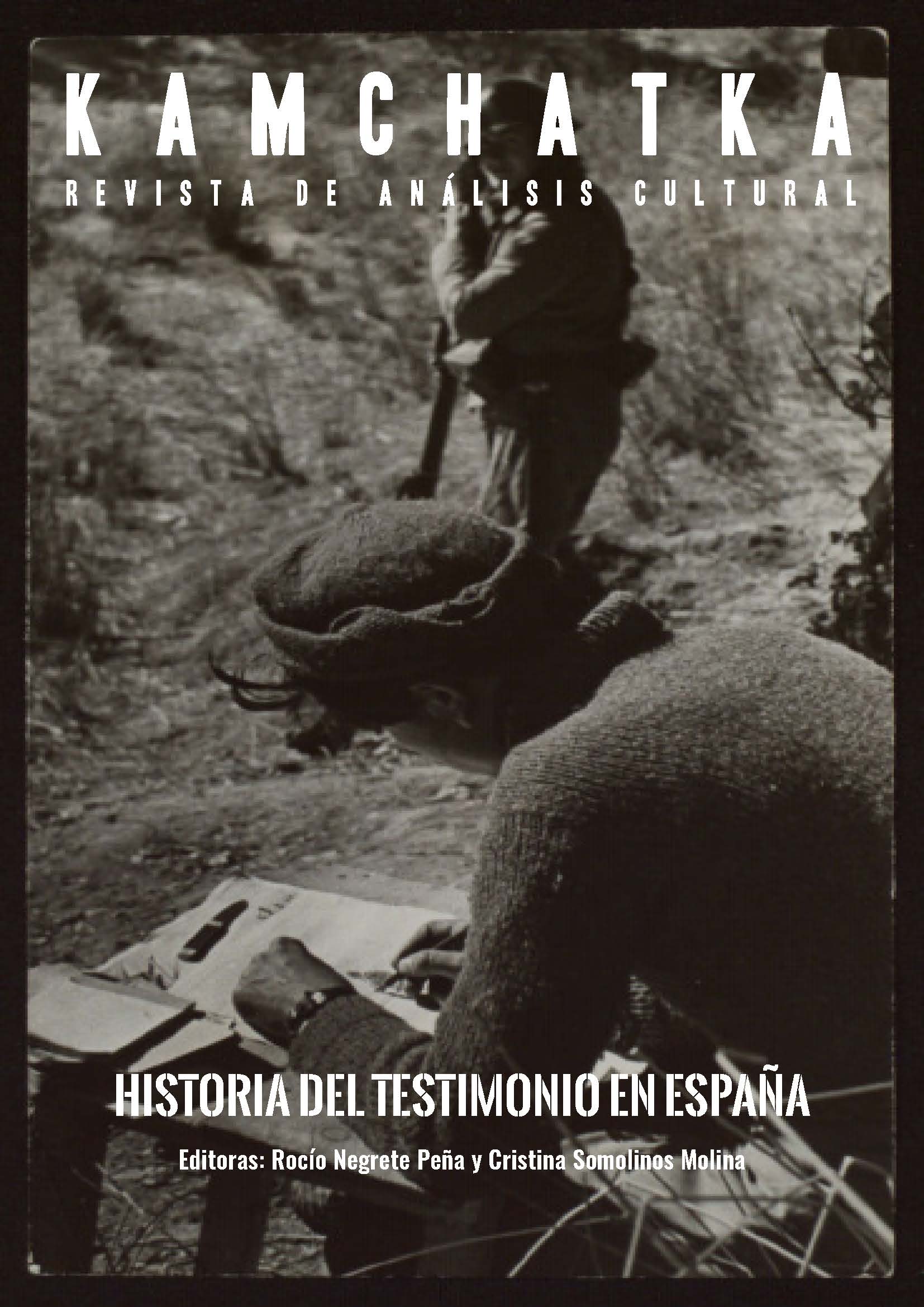Historia del testimonio en España. Una introducción.
DOI:
https://doi.org/10.7203/KAM.21.26622Keywords:
testimonio, literatura testimonial, franquismo, feminismo Abstract
Abstract
Introducción al monográfico
 Downloads
Downloads
 References
References
Agamben, Giorgio (2000). Lo que queda de Auschwitz: el archivo y el testigo, homo sacer III. Valencia: Pre-Textos.
Artières, Philippe y Laborie, Pierre (2002). “Témoignage et récit historique”. Sociétés & Représentations. 13, 1: 199-206.
Basile, Teresa (2022). “Del nosotras revolucionario a las pluralidades de la memoria en el testimonio latinoamericano”. Visitas al Patio. 16, 1: 130-73.
Beverley, John 1993. “El Testimonio En La Encrucijada”. Revista Iberoamericana, 59, 164: 485-95. https://doi.org/10.5195/reviberoamer.1993.5169.
Beverley, John (2004). Testimonio. On the Politics of Truth. Minneapolis, London: University of Minnesota Press.
Beverley, John (2012). “Subalternidad y testimonio en diálogo con ‘Me llamo Rigoberta Menchú y así me nació la conciencia’, de Elizabeth Burgos (con Rigoberta Menchú)”. Nueva sociedad, 238: 102-13.
Català, Neus (1984). De la resistencia y la deportación. 50 testimonios de mujeres españolas. Barcelona: Adgena.
Cuevas, Tomasa (1985): Cárcel de mujeres (1939-1945). Barcelona: Sirocco.
Cuesta Bustillo, Josefina (2003). “Los componentes del testimonio, según Paul Ricoeur”. Historia, antropología y fuentes orales, 30: 41-52.
García Barrientos, José Luis (1996). El lenguaje literario. Vol. 1. La comunicación literaria. Madrid: Arco Libros.
Jelin, Elizabeth (2002). Los trabajos de la memoria, Madrid: Siglo XXI de España Editores.
Koselleck, Reinhart (1993). Futuro pasado: para una semántica de los tiempos históricos. Barcelona: Paidós.
Lanzmann, Claude (1985). Shoa. Les Films Aleph, Historia, Ministère de la Culture de la Republique Française.
Lejeune, Philippe (1975). Le pacte autobiographique. Paris: Seuil.
Levi, Primo (1947). Se questo è un uomo. Turín: El Aleph.
Lindeperg, Sylvie y Wieviorka, Annette, El momento Eichmann. Buenos Aires: Editorial El Ateneo.
Peris Blanes, Jaume (2009): “La vieja memoria del testigo: a propósito del uso de los testimonios en los documentales contemporáneos sobre la guerra civil”. Espéculo: Revista de Estudios Literarios, 41: http://hdl.handle.net/10550/28522
Peris Blanes, Jaume (2014). “Literatura y testimonio: un debate.” Puentes. Revista de crítica literaria y cultural. 1: 10-17.
Peris Blanes, Jaume y Palazón Sáez, Gema (2015). “Avatares del testimonio en América Latina: tensiones, contradicciones, relecturas”. Kamchatka. Revista de análisis cultural. 6: 3-9: https://doi.org/10.7203/KAM.6.7818
Pizarro Cortés, Carolina; Forné, Anna; Stevens Vera, Daniela; Scarabelli, Laura; Lay Brander, Miriam; Navarrete Barría, Sandra; Escobar Robles, Valentina y Troncoso Guzmán, Verónica (2021). Nuevas formas del testimonio, Universidad de Santiago de Chile.
Pollak, Michael (2006). Memoria, olvido y silencio. La producción social de identidades frente a situaciones límite. La Plata: Al Margen: 53-112.
Prins, Gwyn (2009). “Historia oral”. Burke, Peter. Formas de hacer historia. Madrid: Alianza: 144-188
Ricoeur, Paul (2000). La mémoire, l’histoire, l’oubli. París: Seuil.
Sarlo, Beatriz (2006): Tiempo pasado. Cultura de la memoria y giro subjetivo. Una discusión. Buenos Aires: Siglo XXI Argentina.
Sklodowska, Elzbieta (1992). Testimonio hispanoamericano: historia, teoría, poética. Nueva York: Peter Lang.
Smith, Sidonie y Watson, Julia (1992). De-Colonizing the Subject: The Politics of Gender in Women’s Autobiography, University of Minnesota.
Strejilevich, Nora (2022). El Lugar Del Testigo: Escritura y Memoria (Uruguay, Chile y Argentina), Córdoba: Eduvim.
Williams. Raymond (2022 [1979]). “La literatura obrera británica después de 1945”. Cultura y Política. Clase, escritura y socialismo. Madrid: Lengua de Trapo: 153-167.
Wieviorka, Annette (2018). “Le témoin survivant”. Cabanes, Bruno (ed.). Une histoire de la guerre. Du XIXe siècle à nos jours. París: Seuil.
Downloads
Published
How to Cite
-
Abstract857
-
Presentación PDF (Español)553
Issue
Section
License

This journal provides an immediate free access to the content on the principle that freely make investigation available to the public, which promotes an increased global knowledge exchange.
Unless otherwise indicated, texts published in this journal are under the license Attribution-NonComercial 4.0 by Creative Commons. These texts may be copied, distributed and publicly communicated whenever the publication’s author and title are quoted and whenever they are not used for commercial purposes. In any case, intellectual property of the articles and its potential economic rights entirely belong to its authors.
The full license can be consulted on https://creativecommons.org/licenses/by-nc/4.0/. We encourage authors to disseminate papers published in Kamchatka. Journal of cultural analysis electronically, in institutional digital repository or in their websites.





